Analyzing the Role of Psychological Understanding in Management Ethics
VerifiedAdded on 2023/01/18
|11
|2971
|29
Essay
AI Summary
This essay explores the intersection of psychological understanding and normative approaches in business ethics, addressing the question of whether the former renders the latter obsolete. It begins by defining business ethics and normative ethics, highlighting the role of normative ethics in guiding ethical conduct in business settings. The essay then delves into the psychological understanding of moral judgment, discussing how individuals make ethical decisions and the factors that influence these decisions. It further examines the impact of psychological insights on normative ethical frameworks like deontology and consequentialism, considering the strengths and limitations of each approach. The analysis concludes that psychological understanding provides a valuable perspective but does not invalidate normative approaches, as ethical dilemmas require multifaceted considerations, making both perspectives essential for comprehensive ethical decision-making in business. Desklib offers a range of resources including similar essays and past papers to aid students in their studies.
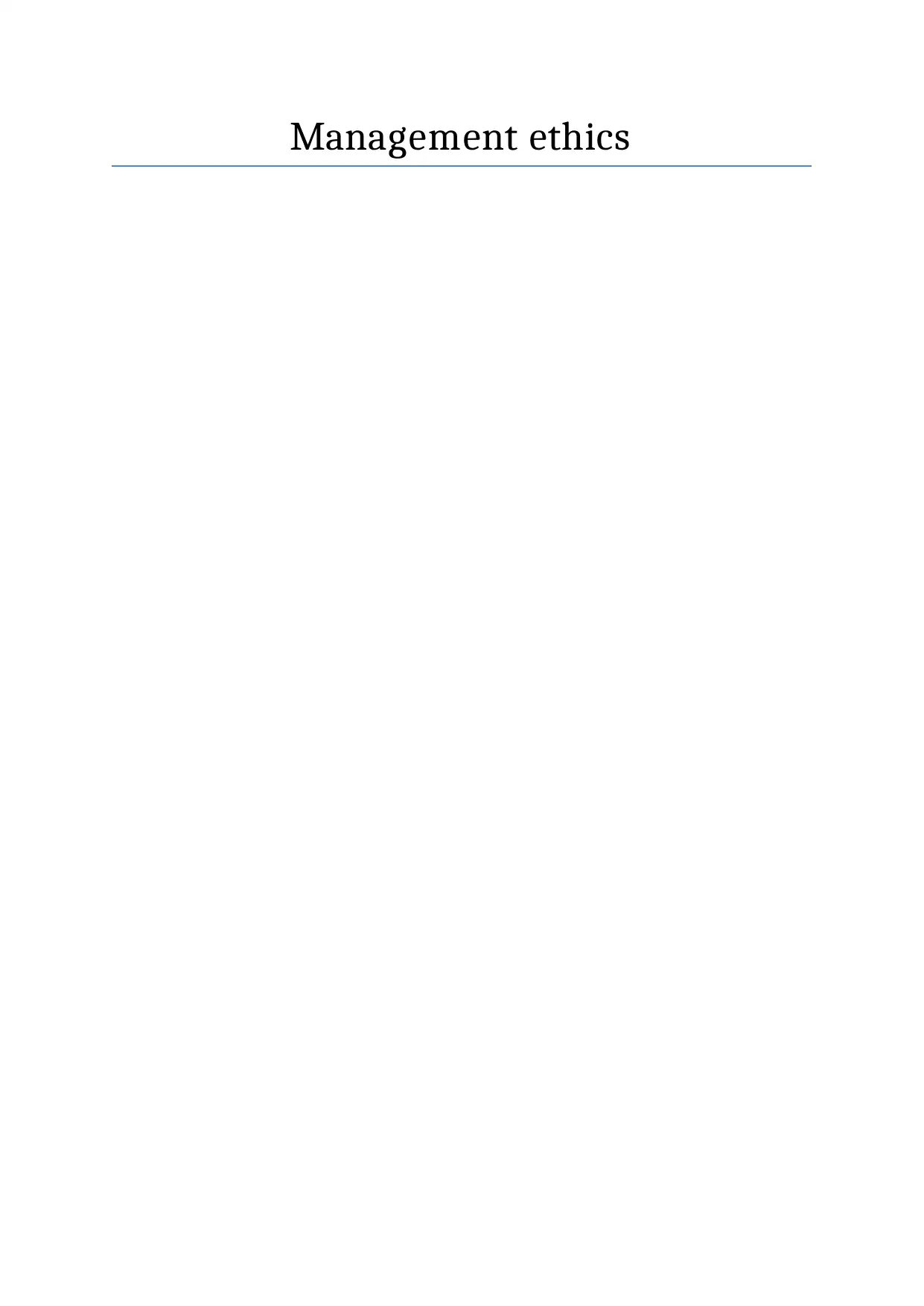
Management ethics
Paraphrase This Document
Need a fresh take? Get an instant paraphrase of this document with our AI Paraphraser
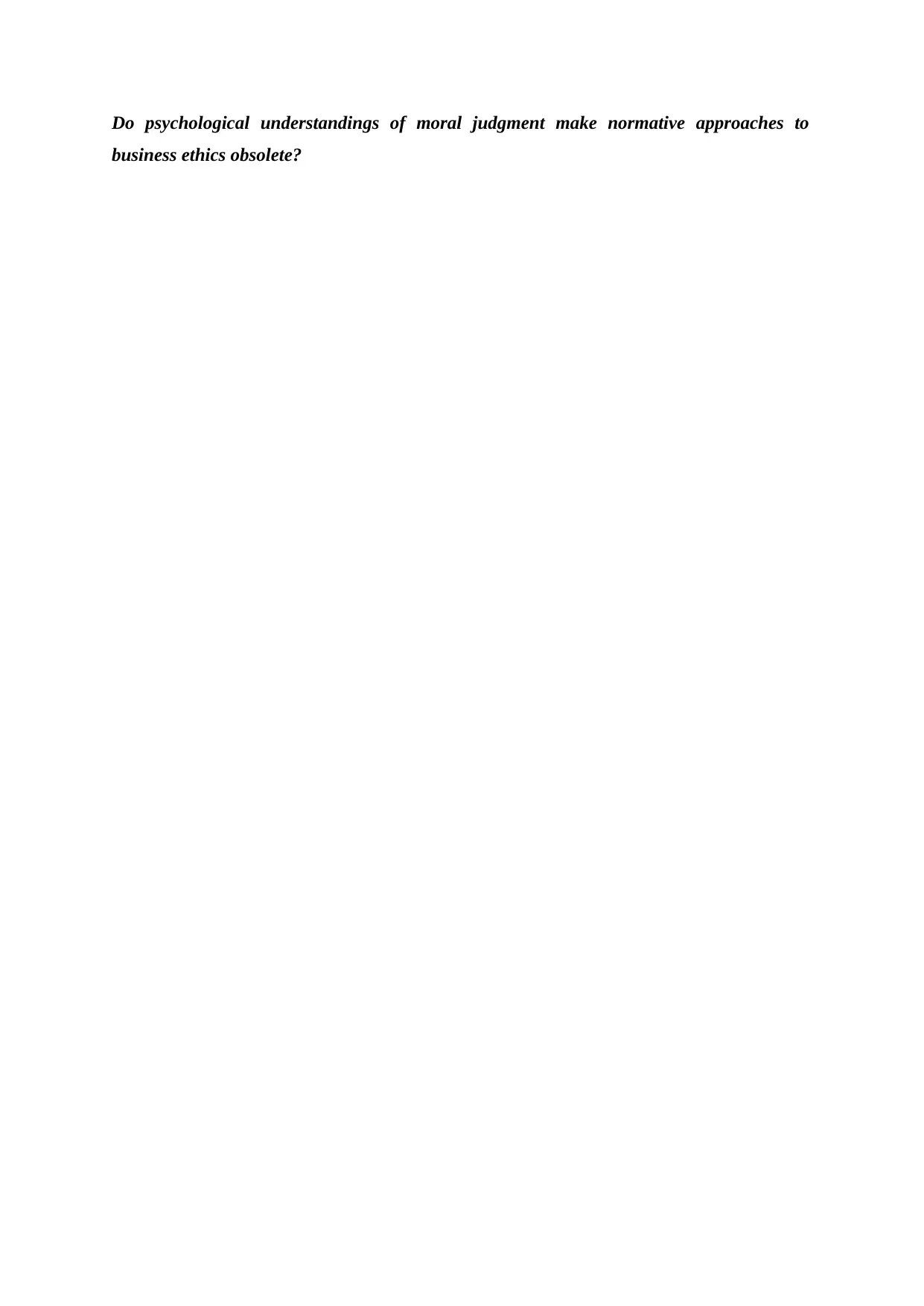
Do psychological understandings of moral judgment make normative approaches to
business ethics obsolete?
business ethics obsolete?
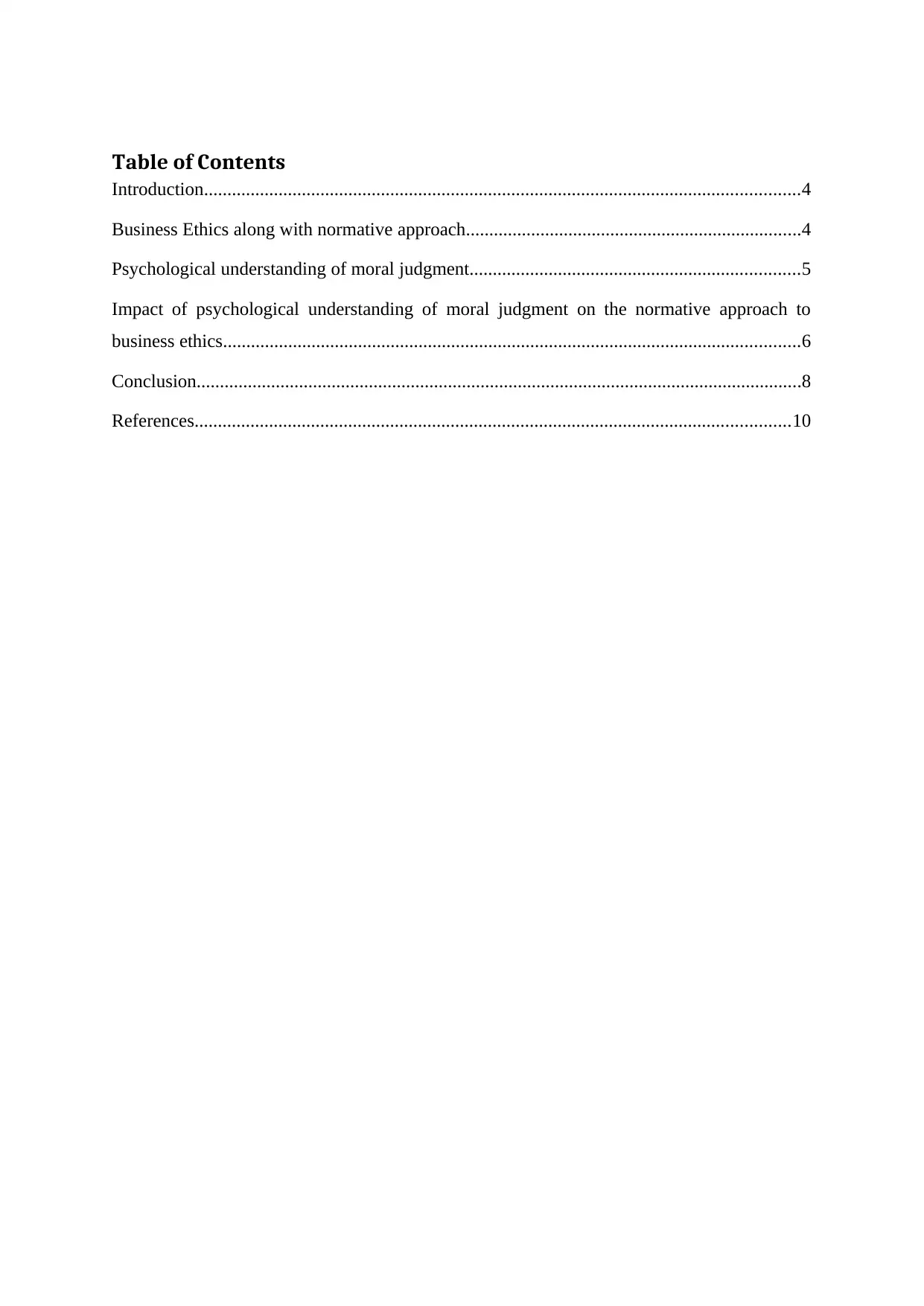
Table of Contents
Introduction................................................................................................................................4
Business Ethics along with normative approach........................................................................4
Psychological understanding of moral judgment.......................................................................5
Impact of psychological understanding of moral judgment on the normative approach to
business ethics............................................................................................................................6
Conclusion..................................................................................................................................8
References................................................................................................................................10
Introduction................................................................................................................................4
Business Ethics along with normative approach........................................................................4
Psychological understanding of moral judgment.......................................................................5
Impact of psychological understanding of moral judgment on the normative approach to
business ethics............................................................................................................................6
Conclusion..................................................................................................................................8
References................................................................................................................................10
⊘ This is a preview!⊘
Do you want full access?
Subscribe today to unlock all pages.

Trusted by 1+ million students worldwide
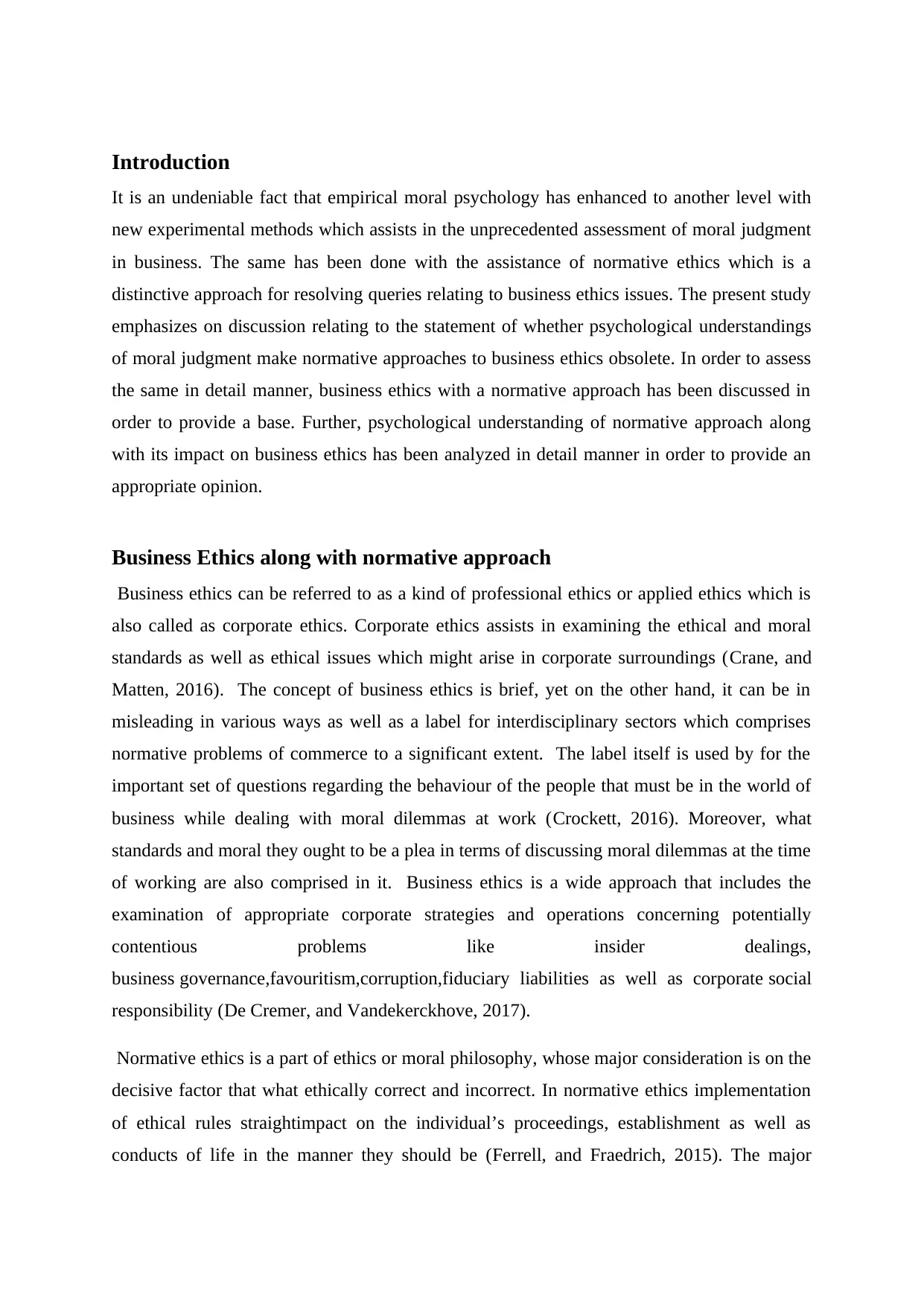
Introduction
It is an undeniable fact that empirical moral psychology has enhanced to another level with
new experimental methods which assists in the unprecedented assessment of moral judgment
in business. The same has been done with the assistance of normative ethics which is a
distinctive approach for resolving queries relating to business ethics issues. The present study
emphasizes on discussion relating to the statement of whether psychological understandings
of moral judgment make normative approaches to business ethics obsolete. In order to assess
the same in detail manner, business ethics with a normative approach has been discussed in
order to provide a base. Further, psychological understanding of normative approach along
with its impact on business ethics has been analyzed in detail manner in order to provide an
appropriate opinion.
Business Ethics along with normative approach
Business ethics can be referred to as a kind of professional ethics or applied ethics which is
also called as corporate ethics. Corporate ethics assists in examining the ethical and moral
standards as well as ethical issues which might arise in corporate surroundings (Crane, and
Matten, 2016). The concept of business ethics is brief, yet on the other hand, it can be in
misleading in various ways as well as a label for interdisciplinary sectors which comprises
normative problems of commerce to a significant extent. The label itself is used by for the
important set of questions regarding the behaviour of the people that must be in the world of
business while dealing with moral dilemmas at work (Crockett, 2016). Moreover, what
standards and moral they ought to be a plea in terms of discussing moral dilemmas at the time
of working are also comprised in it. Business ethics is a wide approach that includes the
examination of appropriate corporate strategies and operations concerning potentially
contentious problems like insider dealings,
business governance,favouritism,corruption,fiduciary liabilities as well as corporate social
responsibility (De Cremer, and Vandekerckhove, 2017).
Normative ethics is a part of ethics or moral philosophy, whose major consideration is on the
decisive factor that what ethically correct and incorrect. In normative ethics implementation
of ethical rules straightimpact on the individual’s proceedings, establishment as well as
conducts of life in the manner they should be (Ferrell, and Fraedrich, 2015). The major
It is an undeniable fact that empirical moral psychology has enhanced to another level with
new experimental methods which assists in the unprecedented assessment of moral judgment
in business. The same has been done with the assistance of normative ethics which is a
distinctive approach for resolving queries relating to business ethics issues. The present study
emphasizes on discussion relating to the statement of whether psychological understandings
of moral judgment make normative approaches to business ethics obsolete. In order to assess
the same in detail manner, business ethics with a normative approach has been discussed in
order to provide a base. Further, psychological understanding of normative approach along
with its impact on business ethics has been analyzed in detail manner in order to provide an
appropriate opinion.
Business Ethics along with normative approach
Business ethics can be referred to as a kind of professional ethics or applied ethics which is
also called as corporate ethics. Corporate ethics assists in examining the ethical and moral
standards as well as ethical issues which might arise in corporate surroundings (Crane, and
Matten, 2016). The concept of business ethics is brief, yet on the other hand, it can be in
misleading in various ways as well as a label for interdisciplinary sectors which comprises
normative problems of commerce to a significant extent. The label itself is used by for the
important set of questions regarding the behaviour of the people that must be in the world of
business while dealing with moral dilemmas at work (Crockett, 2016). Moreover, what
standards and moral they ought to be a plea in terms of discussing moral dilemmas at the time
of working are also comprised in it. Business ethics is a wide approach that includes the
examination of appropriate corporate strategies and operations concerning potentially
contentious problems like insider dealings,
business governance,favouritism,corruption,fiduciary liabilities as well as corporate social
responsibility (De Cremer, and Vandekerckhove, 2017).
Normative ethics is a part of ethics or moral philosophy, whose major consideration is on the
decisive factor that what ethically correct and incorrect. In normative ethics implementation
of ethical rules straightimpact on the individual’s proceedings, establishment as well as
conducts of life in the manner they should be (Ferrell, and Fraedrich, 2015). The major
Paraphrase This Document
Need a fresh take? Get an instant paraphrase of this document with our AI Paraphraser
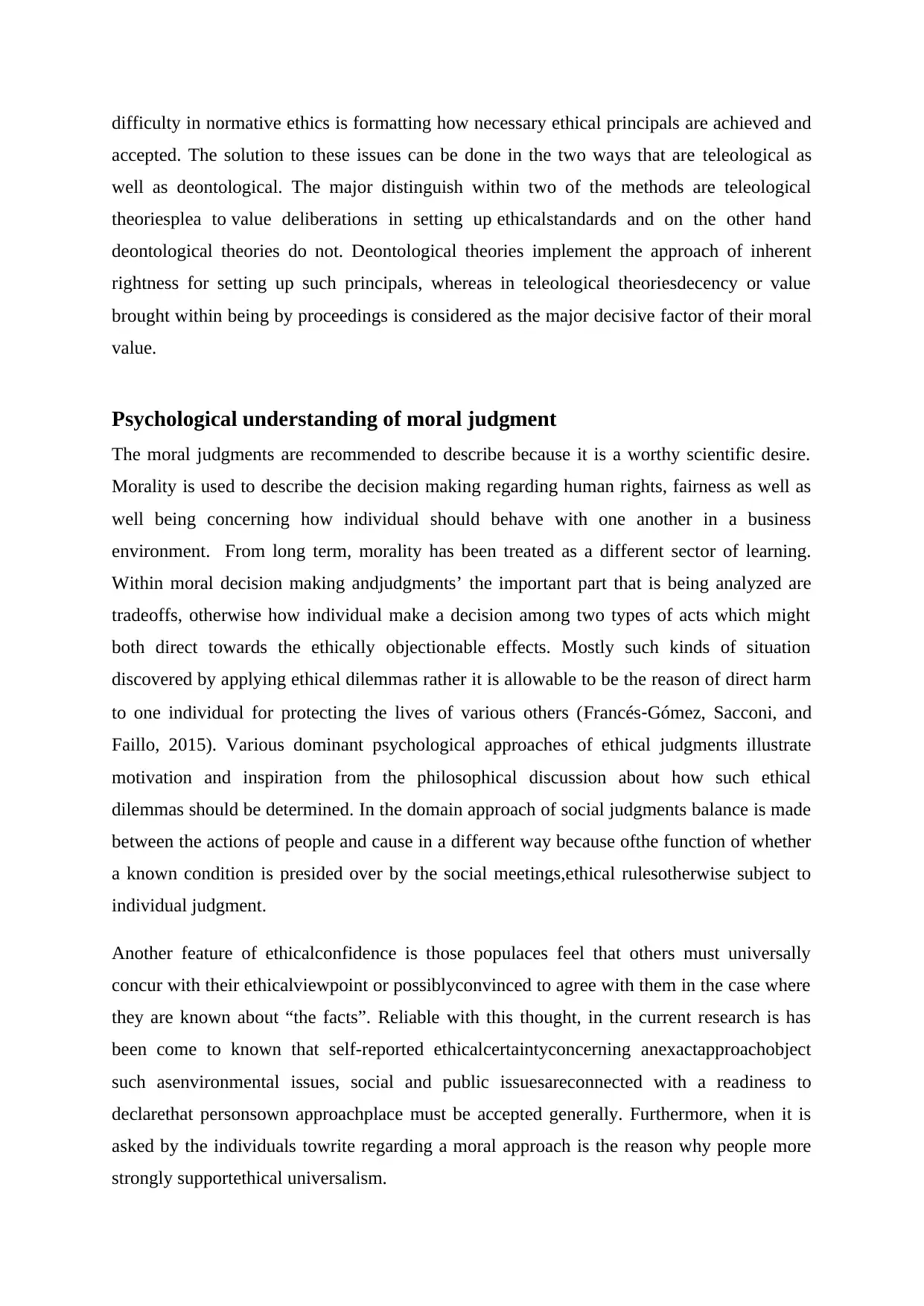
difficulty in normative ethics is formatting how necessary ethical principals are achieved and
accepted. The solution to these issues can be done in the two ways that are teleological as
well as deontological. The major distinguish within two of the methods are teleological
theoriesplea to value deliberations in setting up ethicalstandards and on the other hand
deontological theories do not. Deontological theories implement the approach of inherent
rightness for setting up such principals, whereas in teleological theoriesdecency or value
brought within being by proceedings is considered as the major decisive factor of their moral
value.
Psychological understanding of moral judgment
The moral judgments are recommended to describe because it is a worthy scientific desire.
Morality is used to describe the decision making regarding human rights, fairness as well as
well being concerning how individual should behave with one another in a business
environment. From long term, morality has been treated as a different sector of learning.
Within moral decision making andjudgments’ the important part that is being analyzed are
tradeoffs, otherwise how individual make a decision among two types of acts which might
both direct towards the ethically objectionable effects. Mostly such kinds of situation
discovered by applying ethical dilemmas rather it is allowable to be the reason of direct harm
to one individual for protecting the lives of various others (Francés‐Gómez, Sacconi, and
Faillo, 2015). Various dominant psychological approaches of ethical judgments illustrate
motivation and inspiration from the philosophical discussion about how such ethical
dilemmas should be determined. In the domain approach of social judgments balance is made
between the actions of people and cause in a different way because ofthe function of whether
a known condition is presided over by the social meetings,ethical rulesotherwise subject to
individual judgment.
Another feature of ethicalconfidence is those populaces feel that others must universally
concur with their ethicalviewpoint or possiblyconvinced to agree with them in the case where
they are known about “the facts”. Reliable with this thought, in the current research is has
been come to known that self-reported ethicalcertaintyconcerning anexactapproachobject
such asenvironmental issues, social and public issuesareconnected with a readiness to
declarethat personsown approachplace must be accepted generally. Furthermore, when it is
asked by the individuals towrite regarding a moral approach is the reason why people more
strongly supportethical universalism.
accepted. The solution to these issues can be done in the two ways that are teleological as
well as deontological. The major distinguish within two of the methods are teleological
theoriesplea to value deliberations in setting up ethicalstandards and on the other hand
deontological theories do not. Deontological theories implement the approach of inherent
rightness for setting up such principals, whereas in teleological theoriesdecency or value
brought within being by proceedings is considered as the major decisive factor of their moral
value.
Psychological understanding of moral judgment
The moral judgments are recommended to describe because it is a worthy scientific desire.
Morality is used to describe the decision making regarding human rights, fairness as well as
well being concerning how individual should behave with one another in a business
environment. From long term, morality has been treated as a different sector of learning.
Within moral decision making andjudgments’ the important part that is being analyzed are
tradeoffs, otherwise how individual make a decision among two types of acts which might
both direct towards the ethically objectionable effects. Mostly such kinds of situation
discovered by applying ethical dilemmas rather it is allowable to be the reason of direct harm
to one individual for protecting the lives of various others (Francés‐Gómez, Sacconi, and
Faillo, 2015). Various dominant psychological approaches of ethical judgments illustrate
motivation and inspiration from the philosophical discussion about how such ethical
dilemmas should be determined. In the domain approach of social judgments balance is made
between the actions of people and cause in a different way because ofthe function of whether
a known condition is presided over by the social meetings,ethical rulesotherwise subject to
individual judgment.
Another feature of ethicalconfidence is those populaces feel that others must universally
concur with their ethicalviewpoint or possiblyconvinced to agree with them in the case where
they are known about “the facts”. Reliable with this thought, in the current research is has
been come to known that self-reported ethicalcertaintyconcerning anexactapproachobject
such asenvironmental issues, social and public issuesareconnected with a readiness to
declarethat personsown approachplace must be accepted generally. Furthermore, when it is
asked by the individuals towrite regarding a moral approach is the reason why people more
strongly supportethical universalism.
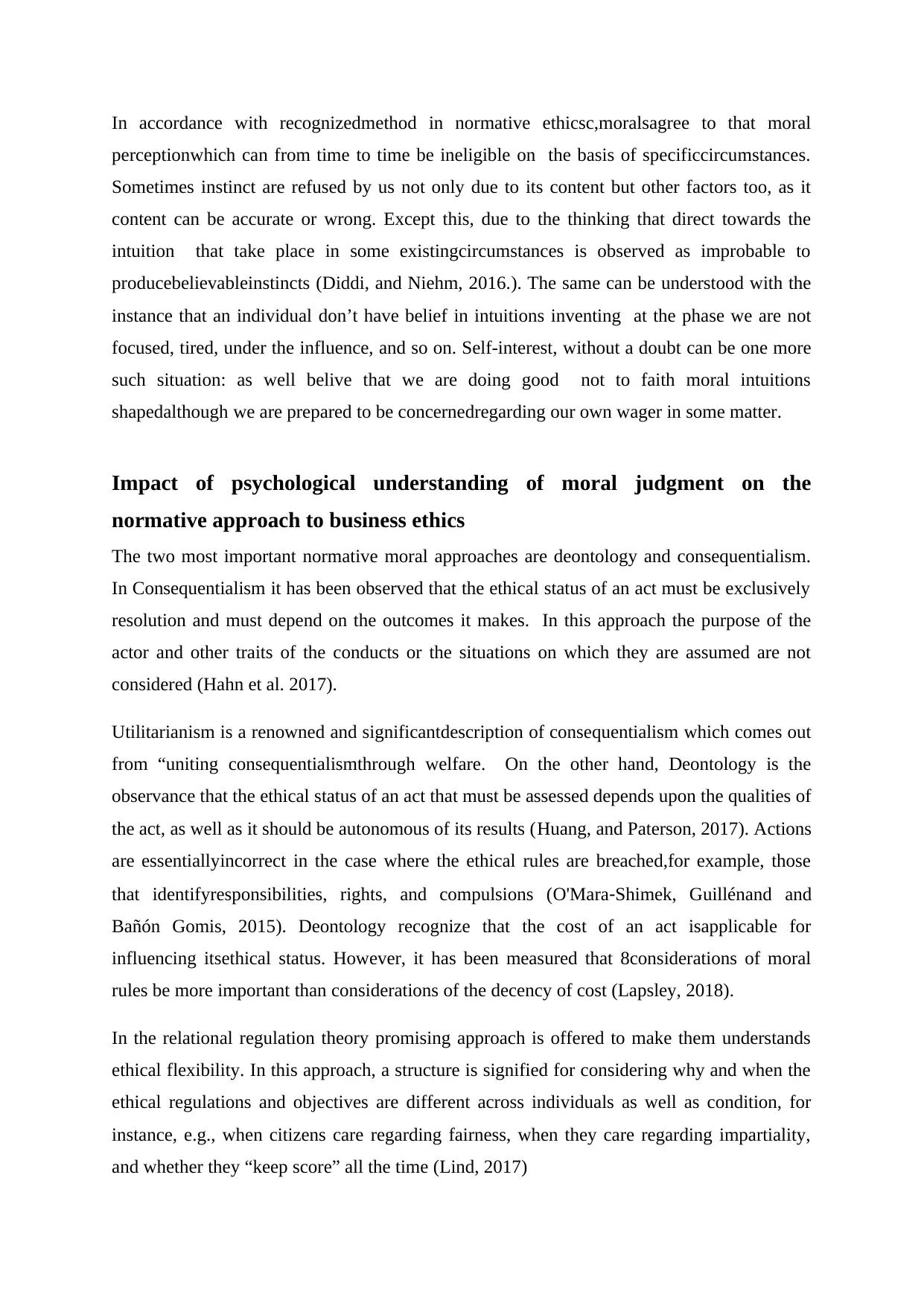
In accordance with recognizedmethod in normative ethicsc,moralsagree to that moral
perceptionwhich can from time to time be ineligible on the basis of specificcircumstances.
Sometimes instinct are refused by us not only due to its content but other factors too, as it
content can be accurate or wrong. Except this, due to the thinking that direct towards the
intuition that take place in some existingcircumstances is observed as improbable to
producebelievableinstincts (Diddi, and Niehm, 2016.). The same can be understood with the
instance that an individual don’t have belief in intuitions inventing at the phase we are not
focused, tired, under the influence, and so on. Self-interest, without a doubt can be one more
such situation: as well belive that we are doing good not to faith moral intuitions
shapedalthough we are prepared to be concernedregarding our own wager in some matter.
Impact of psychological understanding of moral judgment on the
normative approach to business ethics
The two most important normative moral approaches are deontology and consequentialism.
In Consequentialism it has been observed that the ethical status of an act must be exclusively
resolution and must depend on the outcomes it makes. In this approach the purpose of the
actor and other traits of the conducts or the situations on which they are assumed are not
considered (Hahn et al. 2017).
Utilitarianism is a renowned and significantdescription of consequentialism which comes out
from “uniting consequentialismthrough welfare. On the other hand, Deontology is the
observance that the ethical status of an act that must be assessed depends upon the qualities of
the act, as well as it should be autonomous of its results (Huang, and Paterson, 2017). Actions
are essentiallyincorrect in the case where the ethical rules are breached,for example, those
that identifyresponsibilities, rights, and compulsions (O'Mara‐Shimek, Guillénand and
Bañón Gomis, 2015). Deontology recognize that the cost of an act isapplicable for
influencing itsethical status. However, it has been measured that 8considerations of moral
rules be more important than considerations of the decency of cost (Lapsley, 2018).
In the relational regulation theory promising approach is offered to make them understands
ethical flexibility. In this approach, a structure is signified for considering why and when the
ethical regulations and objectives are different across individuals as well as condition, for
instance, e.g., when citizens care regarding fairness, when they care regarding impartiality,
and whether they “keep score” all the time (Lind, 2017)
perceptionwhich can from time to time be ineligible on the basis of specificcircumstances.
Sometimes instinct are refused by us not only due to its content but other factors too, as it
content can be accurate or wrong. Except this, due to the thinking that direct towards the
intuition that take place in some existingcircumstances is observed as improbable to
producebelievableinstincts (Diddi, and Niehm, 2016.). The same can be understood with the
instance that an individual don’t have belief in intuitions inventing at the phase we are not
focused, tired, under the influence, and so on. Self-interest, without a doubt can be one more
such situation: as well belive that we are doing good not to faith moral intuitions
shapedalthough we are prepared to be concernedregarding our own wager in some matter.
Impact of psychological understanding of moral judgment on the
normative approach to business ethics
The two most important normative moral approaches are deontology and consequentialism.
In Consequentialism it has been observed that the ethical status of an act must be exclusively
resolution and must depend on the outcomes it makes. In this approach the purpose of the
actor and other traits of the conducts or the situations on which they are assumed are not
considered (Hahn et al. 2017).
Utilitarianism is a renowned and significantdescription of consequentialism which comes out
from “uniting consequentialismthrough welfare. On the other hand, Deontology is the
observance that the ethical status of an act that must be assessed depends upon the qualities of
the act, as well as it should be autonomous of its results (Huang, and Paterson, 2017). Actions
are essentiallyincorrect in the case where the ethical rules are breached,for example, those
that identifyresponsibilities, rights, and compulsions (O'Mara‐Shimek, Guillénand and
Bañón Gomis, 2015). Deontology recognize that the cost of an act isapplicable for
influencing itsethical status. However, it has been measured that 8considerations of moral
rules be more important than considerations of the decency of cost (Lapsley, 2018).
In the relational regulation theory promising approach is offered to make them understands
ethical flexibility. In this approach, a structure is signified for considering why and when the
ethical regulations and objectives are different across individuals as well as condition, for
instance, e.g., when citizens care regarding fairness, when they care regarding impartiality,
and whether they “keep score” all the time (Lind, 2017)
⊘ This is a preview!⊘
Do you want full access?
Subscribe today to unlock all pages.

Trusted by 1+ million students worldwide
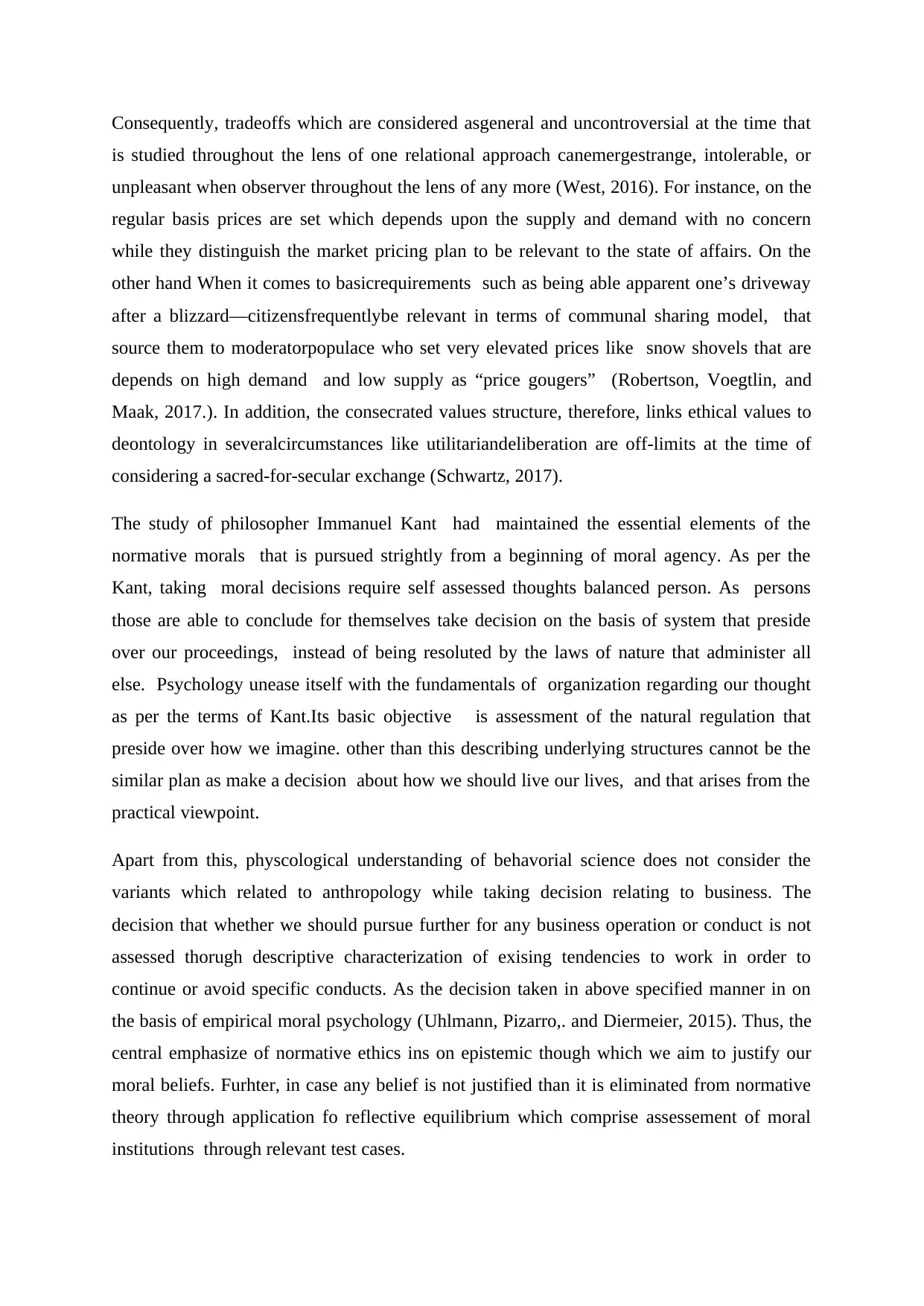
Consequently, tradeoffs which are considered asgeneral and uncontroversial at the time that
is studied throughout the lens of one relational approach canemergestrange, intolerable, or
unpleasant when observer throughout the lens of any more (West, 2016). For instance, on the
regular basis prices are set which depends upon the supply and demand with no concern
while they distinguish the market pricing plan to be relevant to the state of affairs. On the
other hand When it comes to basicrequirements such as being able apparent one’s driveway
after a blizzard—citizensfrequentlybe relevant in terms of communal sharing model, that
source them to moderatorpopulace who set very elevated prices like snow shovels that are
depends on high demand and low supply as “price gougers” (Robertson, Voegtlin, and
Maak, 2017.). In addition, the consecrated values structure, therefore, links ethical values to
deontology in severalcircumstances like utilitariandeliberation are off-limits at the time of
considering a sacred-for-secular exchange (Schwartz, 2017).
The study of philosopher Immanuel Kant had maintained the essential elements of the
normative morals that is pursued strightly from a beginning of moral agency. As per the
Kant, taking moral decisions require self assessed thoughts balanced person. As persons
those are able to conclude for themselves take decision on the basis of system that preside
over our proceedings, instead of being resoluted by the laws of nature that administer all
else. Psychology unease itself with the fundamentals of organization regarding our thought
as per the terms of Kant.Its basic objective is assessment of the natural regulation that
preside over how we imagine. other than this describing underlying structures cannot be the
similar plan as make a decision about how we should live our lives, and that arises from the
practical viewpoint.
Apart from this, physcological understanding of behavorial science does not consider the
variants which related to anthropology while taking decision relating to business. The
decision that whether we should pursue further for any business operation or conduct is not
assessed thorugh descriptive characterization of exising tendencies to work in order to
continue or avoid specific conducts. As the decision taken in above specified manner in on
the basis of empirical moral psychology (Uhlmann, Pizarro,. and Diermeier, 2015). Thus, the
central emphasize of normative ethics ins on epistemic though which we aim to justify our
moral beliefs. Furhter, in case any belief is not justified than it is eliminated from normative
theory through application fo reflective equilibrium which comprise assessement of moral
institutions through relevant test cases.
is studied throughout the lens of one relational approach canemergestrange, intolerable, or
unpleasant when observer throughout the lens of any more (West, 2016). For instance, on the
regular basis prices are set which depends upon the supply and demand with no concern
while they distinguish the market pricing plan to be relevant to the state of affairs. On the
other hand When it comes to basicrequirements such as being able apparent one’s driveway
after a blizzard—citizensfrequentlybe relevant in terms of communal sharing model, that
source them to moderatorpopulace who set very elevated prices like snow shovels that are
depends on high demand and low supply as “price gougers” (Robertson, Voegtlin, and
Maak, 2017.). In addition, the consecrated values structure, therefore, links ethical values to
deontology in severalcircumstances like utilitariandeliberation are off-limits at the time of
considering a sacred-for-secular exchange (Schwartz, 2017).
The study of philosopher Immanuel Kant had maintained the essential elements of the
normative morals that is pursued strightly from a beginning of moral agency. As per the
Kant, taking moral decisions require self assessed thoughts balanced person. As persons
those are able to conclude for themselves take decision on the basis of system that preside
over our proceedings, instead of being resoluted by the laws of nature that administer all
else. Psychology unease itself with the fundamentals of organization regarding our thought
as per the terms of Kant.Its basic objective is assessment of the natural regulation that
preside over how we imagine. other than this describing underlying structures cannot be the
similar plan as make a decision about how we should live our lives, and that arises from the
practical viewpoint.
Apart from this, physcological understanding of behavorial science does not consider the
variants which related to anthropology while taking decision relating to business. The
decision that whether we should pursue further for any business operation or conduct is not
assessed thorugh descriptive characterization of exising tendencies to work in order to
continue or avoid specific conducts. As the decision taken in above specified manner in on
the basis of empirical moral psychology (Uhlmann, Pizarro,. and Diermeier, 2015). Thus, the
central emphasize of normative ethics ins on epistemic though which we aim to justify our
moral beliefs. Furhter, in case any belief is not justified than it is eliminated from normative
theory through application fo reflective equilibrium which comprise assessement of moral
institutions through relevant test cases.
Paraphrase This Document
Need a fresh take? Get an instant paraphrase of this document with our AI Paraphraser
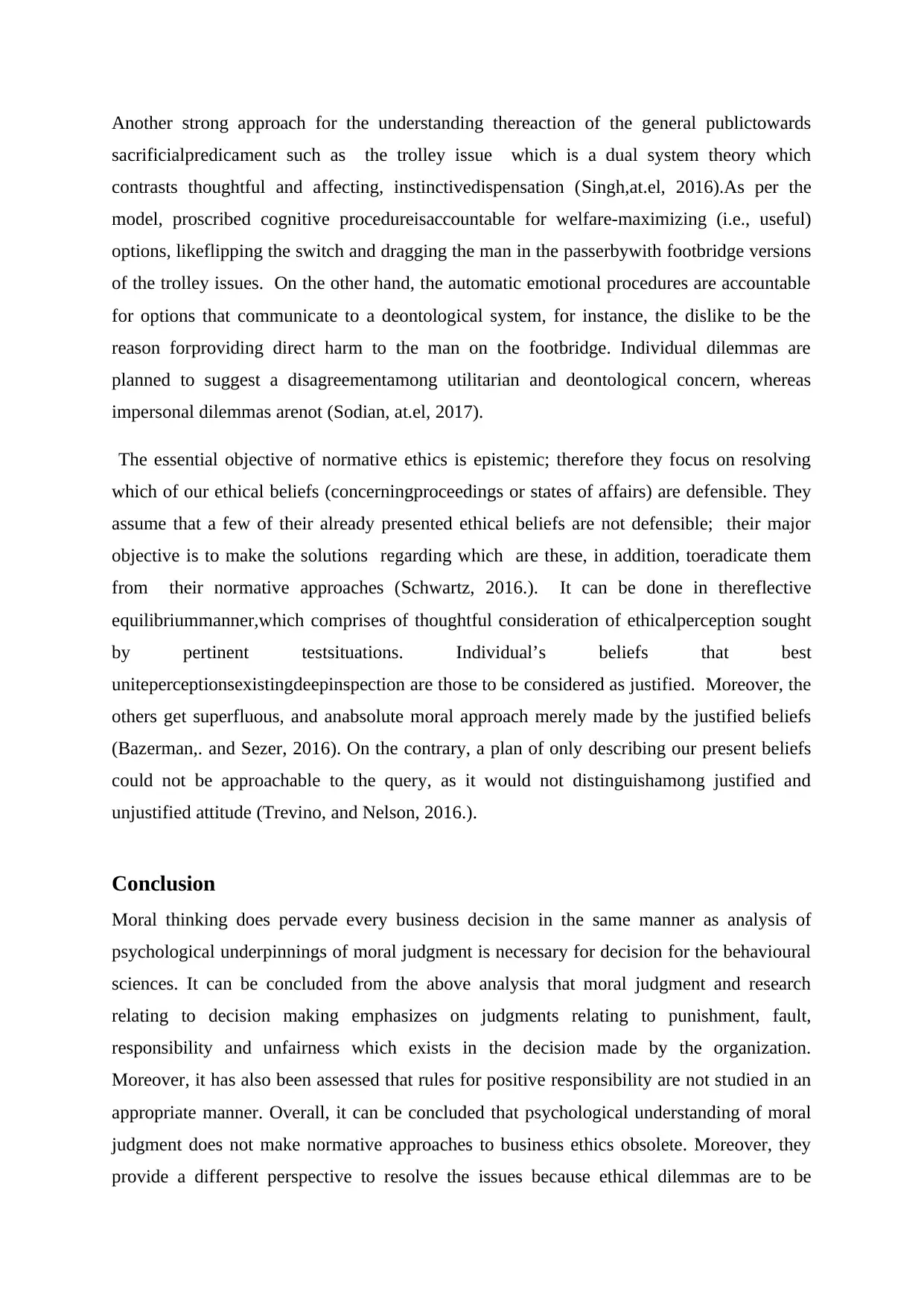
Another strong approach for the understanding thereaction of the general publictowards
sacrificialpredicament such as the trolley issue which is a dual system theory which
contrasts thoughtful and affecting, instinctivedispensation (Singh,at.el, 2016).As per the
model, proscribed cognitive procedureisaccountable for welfare-maximizing (i.e., useful)
options, likeflipping the switch and dragging the man in the passerbywith footbridge versions
of the trolley issues. On the other hand, the automatic emotional procedures are accountable
for options that communicate to a deontological system, for instance, the dislike to be the
reason forproviding direct harm to the man on the footbridge. Individual dilemmas are
planned to suggest a disagreementamong utilitarian and deontological concern, whereas
impersonal dilemmas arenot (Sodian, at.el, 2017).
The essential objective of normative ethics is epistemic; therefore they focus on resolving
which of our ethical beliefs (concerningproceedings or states of affairs) are defensible. They
assume that a few of their already presented ethical beliefs are not defensible; their major
objective is to make the solutions regarding which are these, in addition, toeradicate them
from their normative approaches (Schwartz, 2016.). It can be done in thereflective
equilibriummanner,which comprises of thoughtful consideration of ethicalperception sought
by pertinent testsituations. Individual’s beliefs that best
uniteperceptionsexistingdeepinspection are those to be considered as justified. Moreover, the
others get superfluous, and anabsolute moral approach merely made by the justified beliefs
(Bazerman,. and Sezer, 2016). On the contrary, a plan of only describing our present beliefs
could not be approachable to the query, as it would not distinguishamong justified and
unjustified attitude (Trevino, and Nelson, 2016.).
Conclusion
Moral thinking does pervade every business decision in the same manner as analysis of
psychological underpinnings of moral judgment is necessary for decision for the behavioural
sciences. It can be concluded from the above analysis that moral judgment and research
relating to decision making emphasizes on judgments relating to punishment, fault,
responsibility and unfairness which exists in the decision made by the organization.
Moreover, it has also been assessed that rules for positive responsibility are not studied in an
appropriate manner. Overall, it can be concluded that psychological understanding of moral
judgment does not make normative approaches to business ethics obsolete. Moreover, they
provide a different perspective to resolve the issues because ethical dilemmas are to be
sacrificialpredicament such as the trolley issue which is a dual system theory which
contrasts thoughtful and affecting, instinctivedispensation (Singh,at.el, 2016).As per the
model, proscribed cognitive procedureisaccountable for welfare-maximizing (i.e., useful)
options, likeflipping the switch and dragging the man in the passerbywith footbridge versions
of the trolley issues. On the other hand, the automatic emotional procedures are accountable
for options that communicate to a deontological system, for instance, the dislike to be the
reason forproviding direct harm to the man on the footbridge. Individual dilemmas are
planned to suggest a disagreementamong utilitarian and deontological concern, whereas
impersonal dilemmas arenot (Sodian, at.el, 2017).
The essential objective of normative ethics is epistemic; therefore they focus on resolving
which of our ethical beliefs (concerningproceedings or states of affairs) are defensible. They
assume that a few of their already presented ethical beliefs are not defensible; their major
objective is to make the solutions regarding which are these, in addition, toeradicate them
from their normative approaches (Schwartz, 2016.). It can be done in thereflective
equilibriummanner,which comprises of thoughtful consideration of ethicalperception sought
by pertinent testsituations. Individual’s beliefs that best
uniteperceptionsexistingdeepinspection are those to be considered as justified. Moreover, the
others get superfluous, and anabsolute moral approach merely made by the justified beliefs
(Bazerman,. and Sezer, 2016). On the contrary, a plan of only describing our present beliefs
could not be approachable to the query, as it would not distinguishamong justified and
unjustified attitude (Trevino, and Nelson, 2016.).
Conclusion
Moral thinking does pervade every business decision in the same manner as analysis of
psychological underpinnings of moral judgment is necessary for decision for the behavioural
sciences. It can be concluded from the above analysis that moral judgment and research
relating to decision making emphasizes on judgments relating to punishment, fault,
responsibility and unfairness which exists in the decision made by the organization.
Moreover, it has also been assessed that rules for positive responsibility are not studied in an
appropriate manner. Overall, it can be concluded that psychological understanding of moral
judgment does not make normative approaches to business ethics obsolete. Moreover, they
provide a different perspective to resolve the issues because ethical dilemmas are to be
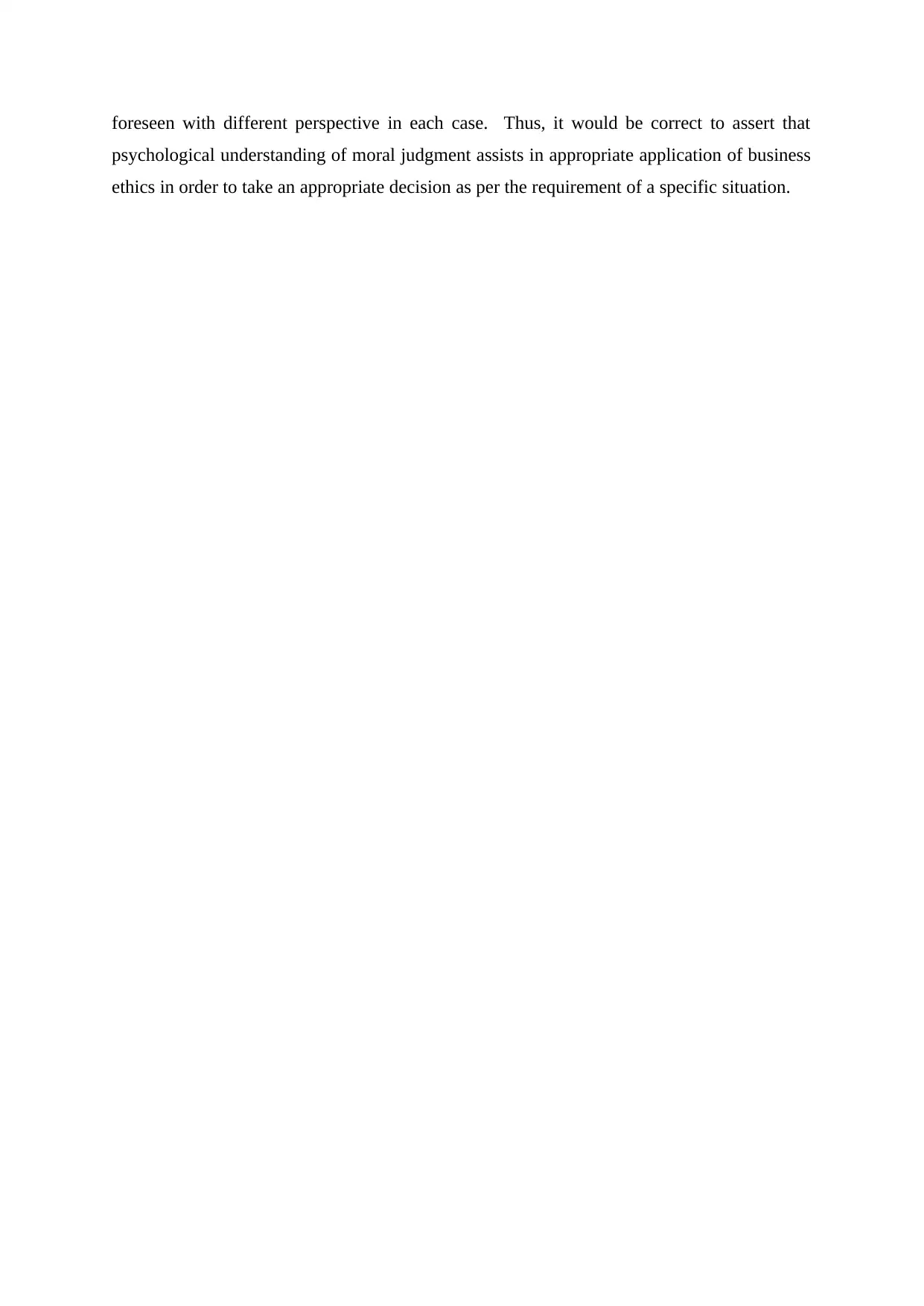
foreseen with different perspective in each case. Thus, it would be correct to assert that
psychological understanding of moral judgment assists in appropriate application of business
ethics in order to take an appropriate decision as per the requirement of a specific situation.
psychological understanding of moral judgment assists in appropriate application of business
ethics in order to take an appropriate decision as per the requirement of a specific situation.
⊘ This is a preview!⊘
Do you want full access?
Subscribe today to unlock all pages.

Trusted by 1+ million students worldwide
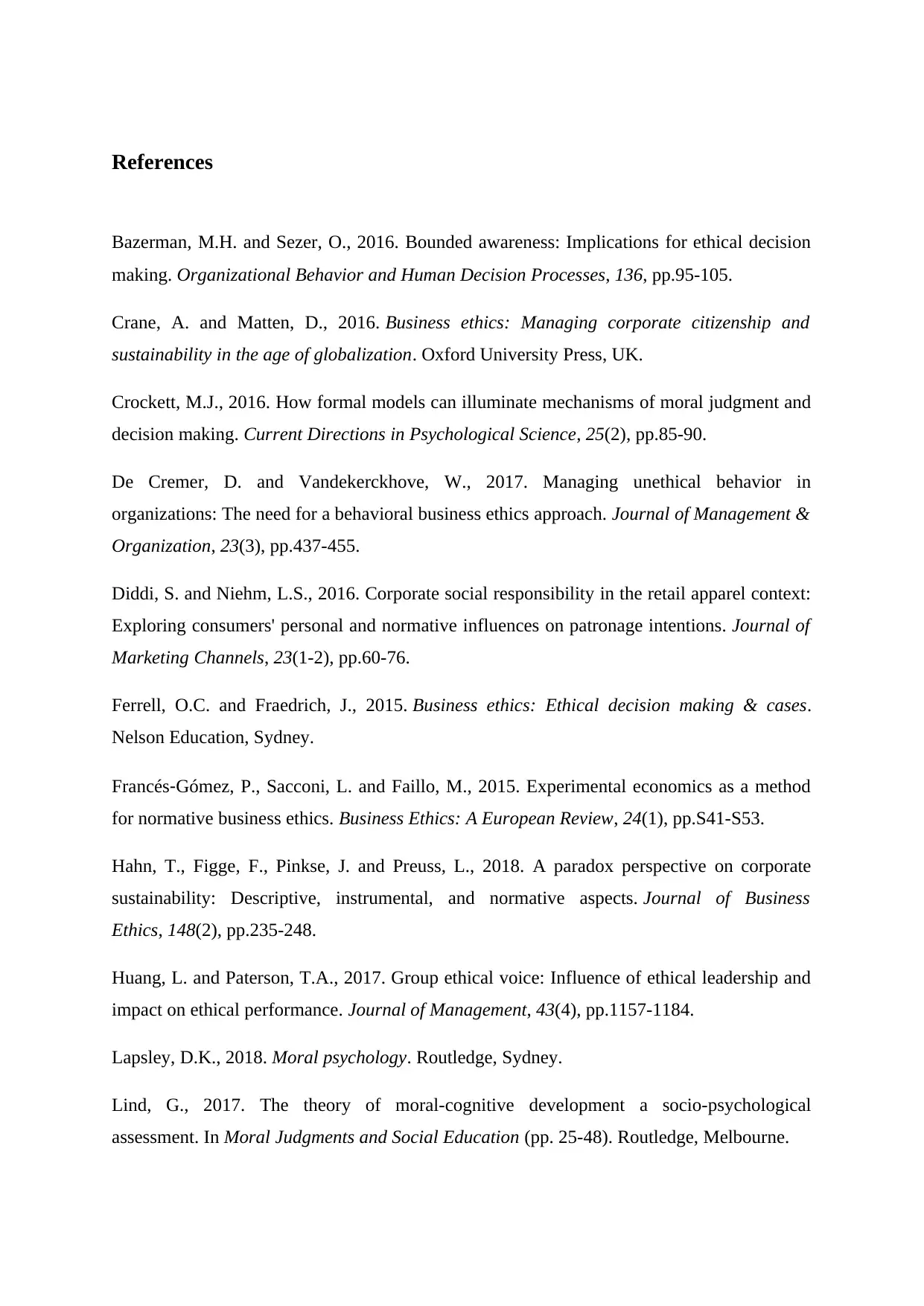
References
Bazerman, M.H. and Sezer, O., 2016. Bounded awareness: Implications for ethical decision
making. Organizational Behavior and Human Decision Processes, 136, pp.95-105.
Crane, A. and Matten, D., 2016. Business ethics: Managing corporate citizenship and
sustainability in the age of globalization. Oxford University Press, UK.
Crockett, M.J., 2016. How formal models can illuminate mechanisms of moral judgment and
decision making. Current Directions in Psychological Science, 25(2), pp.85-90.
De Cremer, D. and Vandekerckhove, W., 2017. Managing unethical behavior in
organizations: The need for a behavioral business ethics approach. Journal of Management &
Organization, 23(3), pp.437-455.
Diddi, S. and Niehm, L.S., 2016. Corporate social responsibility in the retail apparel context:
Exploring consumers' personal and normative influences on patronage intentions. Journal of
Marketing Channels, 23(1-2), pp.60-76.
Ferrell, O.C. and Fraedrich, J., 2015. Business ethics: Ethical decision making & cases.
Nelson Education, Sydney.
Francés‐Gómez, P., Sacconi, L. and Faillo, M., 2015. Experimental economics as a method
for normative business ethics. Business Ethics: A European Review, 24(1), pp.S41-S53.
Hahn, T., Figge, F., Pinkse, J. and Preuss, L., 2018. A paradox perspective on corporate
sustainability: Descriptive, instrumental, and normative aspects. Journal of Business
Ethics, 148(2), pp.235-248.
Huang, L. and Paterson, T.A., 2017. Group ethical voice: Influence of ethical leadership and
impact on ethical performance. Journal of Management, 43(4), pp.1157-1184.
Lapsley, D.K., 2018. Moral psychology. Routledge, Sydney.
Lind, G., 2017. The theory of moral-cognitive development a socio-psychological
assessment. In Moral Judgments and Social Education (pp. 25-48). Routledge, Melbourne.
Bazerman, M.H. and Sezer, O., 2016. Bounded awareness: Implications for ethical decision
making. Organizational Behavior and Human Decision Processes, 136, pp.95-105.
Crane, A. and Matten, D., 2016. Business ethics: Managing corporate citizenship and
sustainability in the age of globalization. Oxford University Press, UK.
Crockett, M.J., 2016. How formal models can illuminate mechanisms of moral judgment and
decision making. Current Directions in Psychological Science, 25(2), pp.85-90.
De Cremer, D. and Vandekerckhove, W., 2017. Managing unethical behavior in
organizations: The need for a behavioral business ethics approach. Journal of Management &
Organization, 23(3), pp.437-455.
Diddi, S. and Niehm, L.S., 2016. Corporate social responsibility in the retail apparel context:
Exploring consumers' personal and normative influences on patronage intentions. Journal of
Marketing Channels, 23(1-2), pp.60-76.
Ferrell, O.C. and Fraedrich, J., 2015. Business ethics: Ethical decision making & cases.
Nelson Education, Sydney.
Francés‐Gómez, P., Sacconi, L. and Faillo, M., 2015. Experimental economics as a method
for normative business ethics. Business Ethics: A European Review, 24(1), pp.S41-S53.
Hahn, T., Figge, F., Pinkse, J. and Preuss, L., 2018. A paradox perspective on corporate
sustainability: Descriptive, instrumental, and normative aspects. Journal of Business
Ethics, 148(2), pp.235-248.
Huang, L. and Paterson, T.A., 2017. Group ethical voice: Influence of ethical leadership and
impact on ethical performance. Journal of Management, 43(4), pp.1157-1184.
Lapsley, D.K., 2018. Moral psychology. Routledge, Sydney.
Lind, G., 2017. The theory of moral-cognitive development a socio-psychological
assessment. In Moral Judgments and Social Education (pp. 25-48). Routledge, Melbourne.
Paraphrase This Document
Need a fresh take? Get an instant paraphrase of this document with our AI Paraphraser
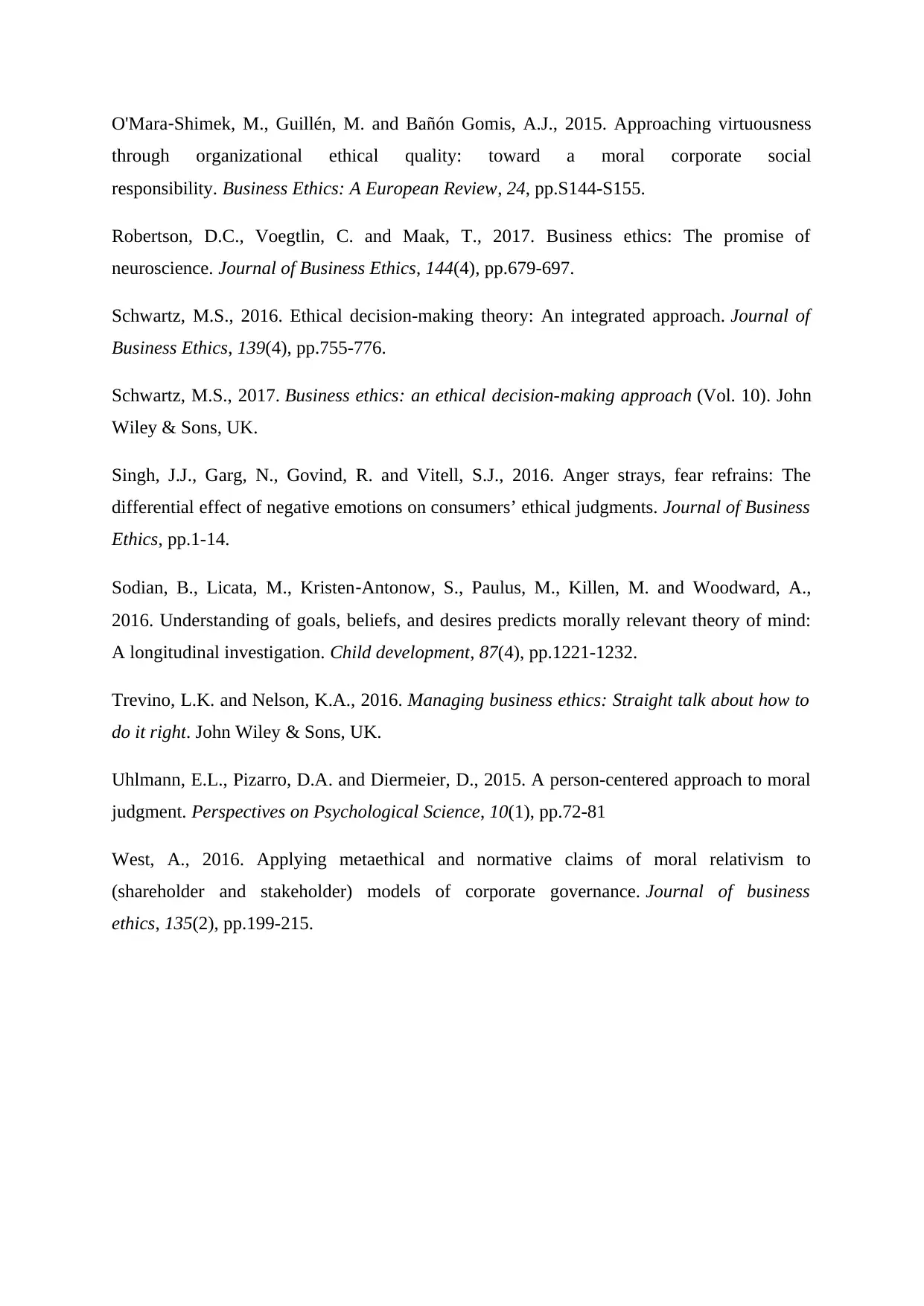
O'Mara‐Shimek, M., Guillén, M. and Bañón Gomis, A.J., 2015. Approaching virtuousness
through organizational ethical quality: toward a moral corporate social
responsibility. Business Ethics: A European Review, 24, pp.S144-S155.
Robertson, D.C., Voegtlin, C. and Maak, T., 2017. Business ethics: The promise of
neuroscience. Journal of Business Ethics, 144(4), pp.679-697.
Schwartz, M.S., 2016. Ethical decision-making theory: An integrated approach. Journal of
Business Ethics, 139(4), pp.755-776.
Schwartz, M.S., 2017. Business ethics: an ethical decision-making approach (Vol. 10). John
Wiley & Sons, UK.
Singh, J.J., Garg, N., Govind, R. and Vitell, S.J., 2016. Anger strays, fear refrains: The
differential effect of negative emotions on consumers’ ethical judgments. Journal of Business
Ethics, pp.1-14.
Sodian, B., Licata, M., Kristen‐Antonow, S., Paulus, M., Killen, M. and Woodward, A.,
2016. Understanding of goals, beliefs, and desires predicts morally relevant theory of mind:
A longitudinal investigation. Child development, 87(4), pp.1221-1232.
Trevino, L.K. and Nelson, K.A., 2016. Managing business ethics: Straight talk about how to
do it right. John Wiley & Sons, UK.
Uhlmann, E.L., Pizarro, D.A. and Diermeier, D., 2015. A person-centered approach to moral
judgment. Perspectives on Psychological Science, 10(1), pp.72-81
West, A., 2016. Applying metaethical and normative claims of moral relativism to
(shareholder and stakeholder) models of corporate governance. Journal of business
ethics, 135(2), pp.199-215.
through organizational ethical quality: toward a moral corporate social
responsibility. Business Ethics: A European Review, 24, pp.S144-S155.
Robertson, D.C., Voegtlin, C. and Maak, T., 2017. Business ethics: The promise of
neuroscience. Journal of Business Ethics, 144(4), pp.679-697.
Schwartz, M.S., 2016. Ethical decision-making theory: An integrated approach. Journal of
Business Ethics, 139(4), pp.755-776.
Schwartz, M.S., 2017. Business ethics: an ethical decision-making approach (Vol. 10). John
Wiley & Sons, UK.
Singh, J.J., Garg, N., Govind, R. and Vitell, S.J., 2016. Anger strays, fear refrains: The
differential effect of negative emotions on consumers’ ethical judgments. Journal of Business
Ethics, pp.1-14.
Sodian, B., Licata, M., Kristen‐Antonow, S., Paulus, M., Killen, M. and Woodward, A.,
2016. Understanding of goals, beliefs, and desires predicts morally relevant theory of mind:
A longitudinal investigation. Child development, 87(4), pp.1221-1232.
Trevino, L.K. and Nelson, K.A., 2016. Managing business ethics: Straight talk about how to
do it right. John Wiley & Sons, UK.
Uhlmann, E.L., Pizarro, D.A. and Diermeier, D., 2015. A person-centered approach to moral
judgment. Perspectives on Psychological Science, 10(1), pp.72-81
West, A., 2016. Applying metaethical and normative claims of moral relativism to
(shareholder and stakeholder) models of corporate governance. Journal of business
ethics, 135(2), pp.199-215.
1 out of 11
Related Documents
Your All-in-One AI-Powered Toolkit for Academic Success.
+13062052269
info@desklib.com
Available 24*7 on WhatsApp / Email
![[object Object]](/_next/static/media/star-bottom.7253800d.svg)
Unlock your academic potential
Copyright © 2020–2026 A2Z Services. All Rights Reserved. Developed and managed by ZUCOL.





